

Making Your Own Fertilizer: Free Fertilizer Recipes. Most gardeners are the do-it-yourself types.

The very act of gardening is do-it-yourself in nature. Can compost kill? Before we get started, let me get this disclosure out of the way: I love compost.

From peeing on my garden mulch to composting the waste from my house move, I've written prolifically about my adventures in rotting biomass. Organic peat free composts, manures and soil conditioners. Dalefoot's quality composts are made using natural materials that are not only renewable but also provide benefits to the landscape and local farmers.
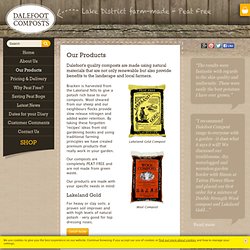
Caption: Lakeland Gold Compost Caption: Wool Compost Bracken is harvested from the Lakeland fells to give a potash rich base to our composts. Wool sheared from our sheep and our neighbours flocks provide slow release nitrogen and added water retention. Hints for a Good Compost. Make Lots of Compost for Free Using Guerilla Compost Tactics. New research: synthetic nitrogen destroys soil carbon, undermines soil health. Just precisely what does all of that nitrogen ferilizer do to the soil?
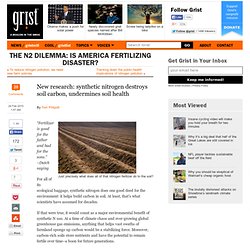
“Fertilizer is good for the father and bad for the sons.” –Dutch saying For all of its ecological baggage, synthetic nitrogen does one good deed for the environment: it helps build carbon in soil. At least, that’s what scientists have assumed for decades. If that were true, it would count as a major environmental benefit of synthetic N use. The case for synthetic N as a climate stabilizer goes like this. Well, that logic has come under fierce challenge from a team of University of Illinois researchers led by professors Richard Mulvaney, Saeed Khan, and Tim Ellsworth.
And their analysis gets more alarming. The loss of organic matter has other ill effects, the researchers say. How to start a compost pile in 4 steps. Now is the perfect time to start a compost pile.
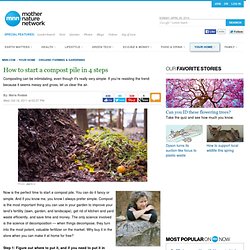
You can do it fancy or simple. And if you know me, you know I always prefer simple. Compost is the most important thing you can use in your garden to improve your land’s fertility (lawn, garden, and landscape), get rid of kitchen and yard waste efficiently, and save time and money. The only science involved is the science of decomposition — when things decompose, they turn into the most potent, valuable fertilizer on the market. Why buy it in the store when you can make it at home for free? Coffee compost. If you are a big coffee drinker and are just getting into composting, use your grounds as a fantastic, free, natural fertilizer.
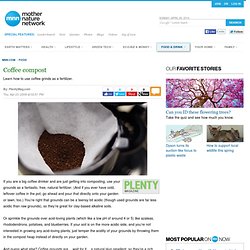
(And if you ever have cold, leftover coffee in the pot, go ahead and pour that directly onto your garden or lawn, too.) You’re right that grounds can be a teensy bit acidic (though used grounds are far less acidic than raw grounds), so they’re great for clay-based alkaline soils. Or sprinkle the grounds over acid-loving plants (which like a low pH of around 4 or 5) like azaleas, rhododendrons, potatoes, and blueberries. If your soil is on the more acidic side, and you’re not interested in growing any acid-loving plants, just temper the acidity of your grounds by throwing them in the compost heap instead of directly on your garden.
And guess what else? The ultimate urban composting guide. If the idea of composting fills your head with images of a large backyard and a big compost bin, it's time to rethink what composting means.
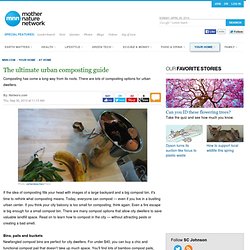
Today, everyone can compost — even if you live in a bustling urban center. If you think your city balcony is too small for composting, think again. Even a fire escape is big enough for a small compost bin. There are many compost options that allow city dwellers to save valuable landfill space. Read on to learn how to compost in the city — without attracting pests or creating a bad smell.
Garden compost making. How To Compost With A Compost Pile - Pictures And Description. Custom Search When you think of garden compost - what comes to mind?
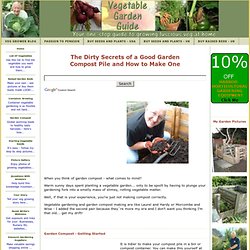
Warm sunny days spent planting a vegetable garden... only to be spoilt by having to plunge your gardening fork into a smelly mass of slimey, rotting vegetable matter. How to Find Free Compost Ingredients. 1Ask your local coffee shop if they throw out used coffee grinds.
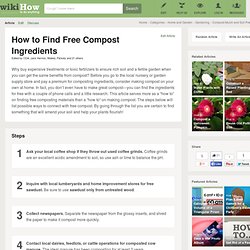
Coffee grinds are an excellent acidic amendment to soil, so use ash or lime to balance the pH. Ad 2Inquire with local lumberyards and home improvement stores for free sawdust. Be sure to use sawdust only from untreated wood. 3Collect newspapers. Separate the newspaper from the glossy inserts, and shred the paper to make it compost more quickly. 4Contact local dairies, feedlots, or cattle operations for composted cow manure. The ideal manure has been composting for at least 2 years. 5Call a local food processing plant to inquire if they have any left over organic material.6Visit your local zoo and ask about retrieving compost from the exhibit animals.
Preventing Flies from Hoarding Your Compost Bin. The science of compost. Composting at home is fairly straightforward, but can go wrong quickly, and your nose knows when the compost container isn’t working properly. A functioning compost pile should smell faintly like warm earth. There are several causes of foul-smelling compost, and several practical solutions. Mark King is a compost expert with the division of solid waste management at the Maine Department of Environmental Protection.
Anti-Aging Face Creams. An Introduction on The Worlds Best Compost: A Fair Overview This guide of The World's Best Compost is brought to you by FaceLube, your best source for Best Face Moisturizer for Men and the Best Male Grooming kits. While you are here, don't forget to see FaceLube's amazing broad spectrum anti-aging sunscreen and happy customer compliments on Amazon.
Make Your Own Alchemy / Prepping, Planting and Harvesting. Does “black gold” make you think of “Texas Tea,” or that three-letter-word, oil?
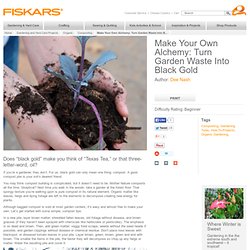
If you’re a gardener, they don’t. For us, black gold can only mean one thing: compost. A good compost pile is your soil’s dearest friend. Use Wood Mulch to Build Great Garden Soil. Most organic gardeners find that following nature’s patterns serves them well. When it comes to building richer soil, nature’s plan relies heavily on trees — fallen limbs, leaves, cones, seeds and, eventually, the massive trunks.
Adapting this plan for building garden soil by using a wood mulch — such as wood chips, sawdust or other woody residues — is a strategy that promises huge, long-term returns. Field studies dating back to the 1950s — and as recent as this year — suggest that a high-fiber diet of woody materials is exactly what many soils need. Rotted bits of wood persist as organic matter for a long time, enhancing the soil’s ability to retain nutrients and moisture, which results in bigger, better crops.
But wait: Woody materials are high in carbon and cellulose, so they need nitrogen and time in order to decompose. Vermicompost Right in Your Garden - Make a Worm Bucket. Photo Credit: lessismorebalanced, Flickr Creative Commons Attribution License. I am a big fan of vermicomposting. It can be done indoors or out, and it's still fun, even after all the time I've been composting with worms, to watch my apple cores and coffee grounds turn into amazing, nutrient-rich vermicompost.
If you're looking for an even easier way to compost with worms, consider installing a worm bucket right in your garden bed.One of the more work-intensive parts of keeping a worm bin (depending on the style of bin you have) is harvesting the vermicompost. For example, the bin I have is just that: a bin. There are no levels for the worms to move to. A Pile of Comments About Compost. Talkin' Trash...Heaps. Composting: A timetable. Everyone knows that composting your fruit and vegetable scraps and other biological material is much better than sending those scraps to the city dump, where they would turn into methane gas.
Organic Gardening, Make Compost & Grow Plants. Homemade Fertilizers That Anyone Can Make. Everything You Need to Know About Composting With Worms. Compost tea made easy ! Holy Shit: The Secret Behind Creating Truly Sustainable Food. Make a Worm Bucket. How to Start a Compost Pile. Fossil fuels, chemical fertilizers, and farm animals. Michael Pollan moves on from his brief discussion of wild animal deaths on farms to point out certain environmental challenges of a vegan world. He argues, The vegan Utopia would also condemn people in many parts of the country to importing all their food from distant places. In New England, for example, the hilliness of the land and rockiness of the soil has dictated an agriculture based on grass and animals since the time of the Puritans. (326) New England has left the time of the Puritans, however.
Make Lots of Compost for Free Using Guerilla Compost Tactics. Using Molasses To Boost Fertilizer. Molasses added to your organic fertilizers feeds the healthy microbes in the soil, mulch and on the plant leaves. Many people are interested in ways to increase the health of their gardens without the use of harsh chemicals. Urine could hold secret to crop fertilisation. No longer of use to the body that excretes it, urine is getting a second life in the form of fertiliser thanks in part to Swiss engineers.
The Swiss Federal Institute of Aquatic Science and Technology (Eawag) has teamed up with specialists in South Africa to convert human urine into fertiliser. “We treat the urine and extract the nitrogen, phosphorus and potassium in a powder form. Our idea at the moment is to granulate this powder so that we have granules like normal fertiliser, which can be spread on the fields,” explained Eawag process engineer Kai Udert.The phosphorus found in urine is particularly precious. Plants need it in order to thrive, yet it is becoming rare.
Typically, phosphorous is mined, yet experts have predicted that the world supply will run out within the next 50-100 years – making crop fertilisation a challenge.Last month, the Eawag project received $3 million (SFr2.9 million) in grant money from the Bill & Melinda Gates Foundation. Composting with Worms. 75 Things You Can Compost, But Thought You Couldn't - Planet Green. The basics of composting are simple. A Pile of Comments About Compost. 6 Tips for Building Soil for Your Raised Garden Beds and Planters. When my wife and I first started gardening in earnest, the results were discouraging. The seeds we planted would sprout and begin to grow, but soon the rate of growth would slow and produce undersize vegetables. Garden compost making. How To Compost With A Compost Pile - Pictures And Description. Chop Chop Compost. Easy Organic Compost. 30 things you should never compost or recycle.
The Humanure Handbook. Make Your Own Alchemy / Prepping, Planting and Harvesting. 75 Things You Can Compost, But Thought You Couldn't - Planet Green. DIY Compost Tumbler Tutorial. Comfrey Concentrate Liquid Feed. Microbial Life - Educational Resources.
30 things you should never compost or recycle. Highfields Composting. Crazy About Compost. In the Field: Creating compost on a massive scale. Preventing Flies from Hoarding Your Compost Bin. Toter Composter. Battling for the decomposed crown. Urine could hold secret to crop fertilisation. Fossil fuels, chemical fertilizers, and farm animals « Say what, Michael Pollan? Holy Shit: The Secret Behind Creating Truly Sustainable Food. Kitchen Compost Pail (Bucket, Bin) – DIY, Easy, and Frugal.
Everything You Need to Know About Composting With Worms.